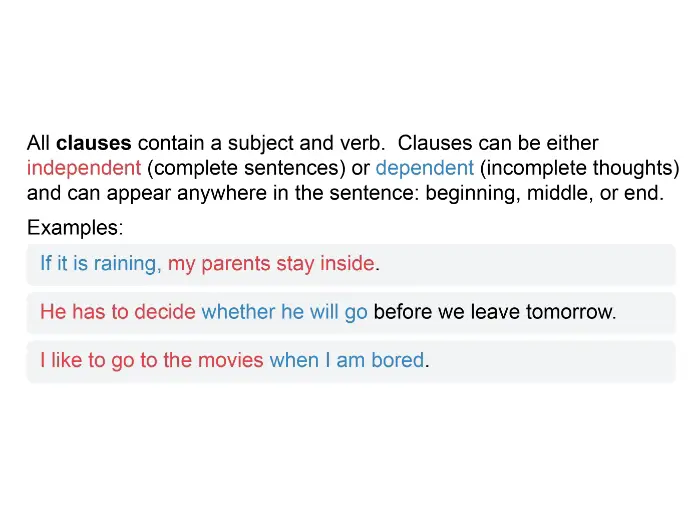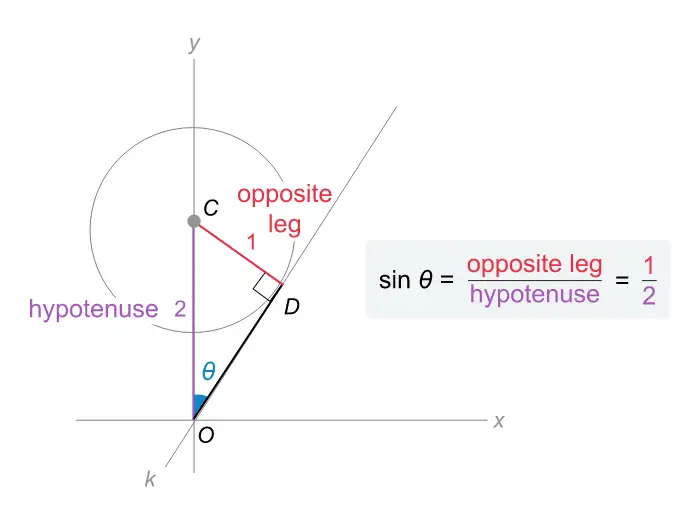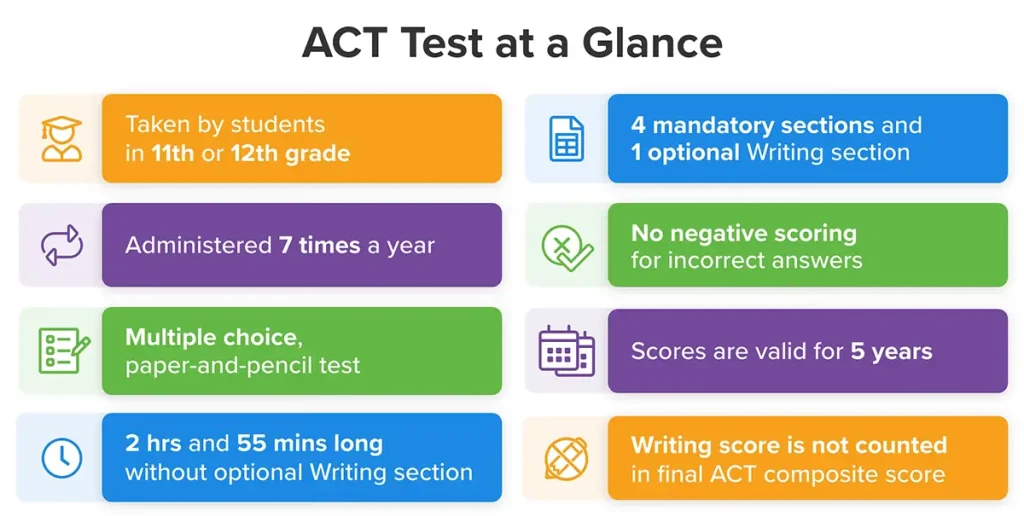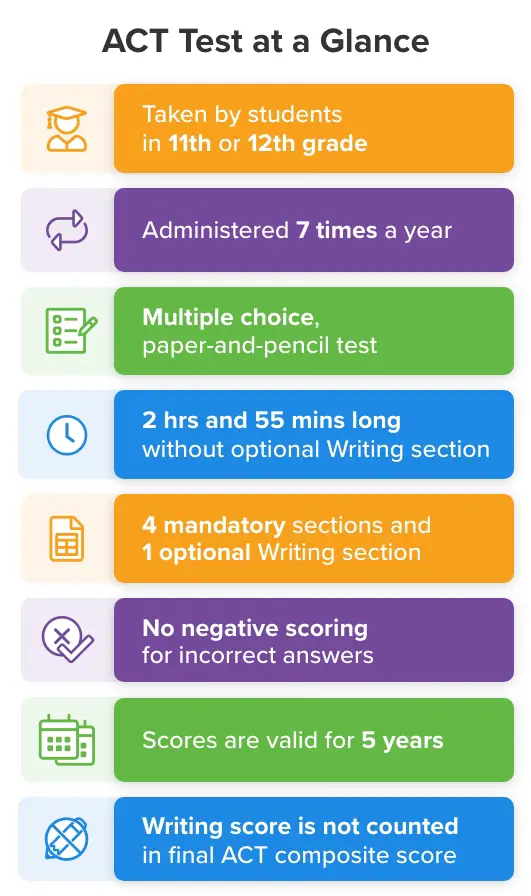About the ACT®
Test Information Guide
The American College Testing (ACT®) test is a standardized test used for college admissions across the United States. This test was developed in 1959 by a non-profit organization, ACT Inc., and remains one of the two most popular college admission tests to date, along with the SAT. However, over the years, the ACT test has evolved in its format, syllabus, and scoring criteria, but its purpose and significance remain the same.
In this guide, we will walk you through the basics of the ACT test to help you decide whether it is a good choice for you. We will discuss the exam’s functionality, eligibility requirements, format, and scoring system so you know what to expect.
ACT Overview
The ACT test is accepted by all four-year colleges and universities in the United States and more than 200 universities outside the U.S. Over a million students take the ACT every year – about 1.35 million students took the test in 2022. With such a large number of participants, it is clear that the ACT is a test you should take if you wish to attend college.
The ACT test is used to measure a student’s college readiness. It provides colleges with a standard benchmark to assess a student’s overall academic skill set and indicate how prepared they are to attend and succeed in college.
Format of the ACT
The ACT test is divided into four separately-timed sections, and one optional section. The table below shows the number of questions and the duration for each section:
| Test Section | No. of Questions | Duration |
|---|---|---|
| English | 75 | 45 mins |
| Mathematics | 60 | 60 mins |
| Reading | 40 | 35 mins |
| Science | 40 | 35 mins |
| Total | 215 | 2 hours 55 mins |
| Optional Writing | 1 Essay | 40 mins |
So, how long is the ACT Test? 2 hrs 55 mins if you are taking the test without optional writing section and 3 hrs 35 mins with optional writing section.
What does the ACT consist of?
As you may already know, the ACT consists of multiple-choice tests in four compulsory subject areas: English, math, reading, and science. A fifth optional section, Writing, does not contribute to your composite ACT score. Each test section is designed to assess a specific set of skills.
- English – this section tests your ability to read and assess a given text. You'll be asked to revise and edit the passage based on your understanding. You can get passages from any literary genre, both fiction and non-fiction.
- Math – this section asks you to assess and solve math problems based on the mathematical skills you’ve acquired in your middle and high school math courses.
- Reading – as the name suggests, this test assesses your ability to read, comprehend, and process information from passages(s). You will get questions that prompt you to demonstrate how you draw inferences from multiple data sources.
- Science – the Science Test includes physics, biology, chemistry, and Earth/space sciences questions. The questions on this test require you to interpret, analyze, reason, and evaluate information from the scientific passages provided.
- Writing (Optional) – the optional Writing section prompts you with one essay topic. You will be tested on your command of conventional English grammar and writing style.
Our guide to the ACT Syllabus is here to help you understand the nitty-gritties of the topics, concepts and skills tested on the ACT. Remember to check it out!
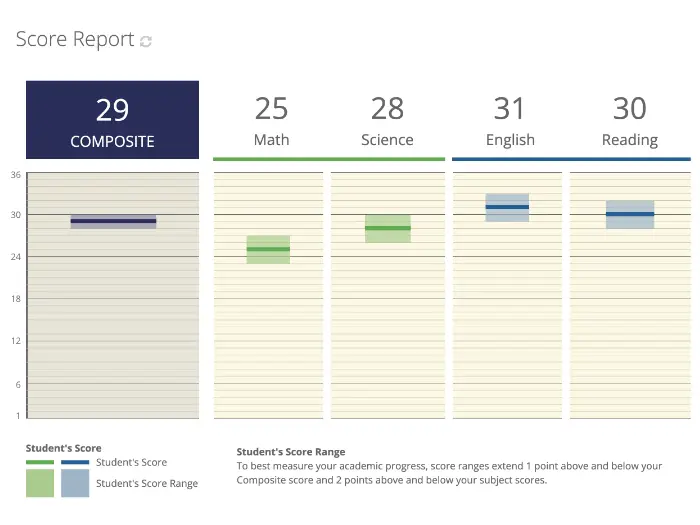
How does ACT scoring work?
ACT test scores range from 1 to 36, with 36 being the highest possible score. Each section of the ACT is scored separately. One point is awarded for each correct answer, and you don’t lose points for wrong answers or unanswered questions. Once the entire test is scored, each raw score is converted to a scaled score. Finally, the four scaled scores are averaged to create a composite score.
The Writing Test, if you choose to take it, is graded based on four separate domains: ideas and analysis, development and support, organization, and language use and conventions. Each area is assigned a score ranging from one to six, with six being the highest possible score. The Writing score is not counted in the final ACT composite score.
How Important Is the ACT?
Is the ACT worth taking? How does it help your college education? We’ve compiled a list of pointers to help you understand why taking the ACT could be an important stepping stone for your career:
-
Most four-year colleges look at your ACT scores
According to the ACT brochure, your ACT test scores are accepted by all four-year colleges in the United States. That said, most schools, especially the big ones, won't let you apply without a certain minimum ACT score.
-
A good ACT score boosts your chances of scholarships
We all know that college tuition is expensive. A high ACT score can reduce your financial liabilities and help you secure college funding. The higher your ACT score is, the more likely you are to receive financial aid to fund your college education.
-
ACT scores affect college placement and future career
Registering for the ACT opens you up to a college admissions test, college course placement options, along with career planning services for a fee of $63. In addition, you become visible to colleges and scholarship programs. This helps you in the long run if you plan for a successful academic career after high school.
-
ACT scores are more reliable than transcripts for college admission
A good ACT score tells colleges that you took a standardized test and demonstrated your college readiness. This gives colleges a reliable benchmark to measure your overall academic merit, especially if you went to a high school they are not familiar with.
-
Even test-optional colleges look at your ACT scores
You read that right! Just because a college is “test-optional,” it doesn’t mean they will not consider your admission test scores. Although you are not required to submit your ACT scores during college application, including them will make your application stand out and demonstrate your college readiness.
Why Should You Take the ACT?
To reiterate, taking the ACT increases your chances of attending a good college exponentially. In addition to expanding your options for colleges, scholarships, and placements, there are a few other factors to consider if you're still debating whether the ACT is the right test for you.
-
Balance a lower GPA with your ACT score
Most colleges favor ACT scores over high school transcripts. Scoring high on the ACT gives you a chance to make up for a lower GPA by showing colleges your academic potential and career readiness.
-
The ACT assesses you distinctly on math, science, and STEM
The ACT scoring system considers your knowledge and skill-set in math and sciences. You get dedicated section-scores for math, science, and STEM. This allows colleges to place you in specific courses for your freshman year based on your ACT section scores and career interests.
-
Your state or high school might require the ACT
Some states require their students to take the ACT in order to graduate from high school. This option is provided as part of the ACT National Day. If you are taking the ACT under this program, you might be able to take the test for free.
-
The Math section constitutes 25% of the ACT final score weight
The ACT test includes a math section that constitutes only one-fourth of your final test score. In addition, you are allowed to use a calculator through the ACT Math section. Clearly, the Math section of the ACT is less crucial than it is on the SAT. So, if you’re someone who is not confident in their math skills, taking the ACT might be a convenient option.

Is the ACT Hard?
Whether the ACT is hard or easy is a matter of your academic aptitude and skillset. The ACT tests you on your reading, analytical, scientific reasoning, and mathematical skills, which indicate your overall college readiness. While preparing for any standardized test demands dedication and rigor, here are a few pointers that could make the ACT a challenging test to ace:
-
Time Constraint
You are required to answer 215 multiple-choice questions (MCQs) in a span of 2 hours 55 minutes. This gives you roughly 48 seconds per question. The time constraint can make the ACT a challenging test to take.
-
Challenging Math Section
The ACT Math section covers a vast math syllabus when compared to its competitor, the SAT. In addition, you are required to memorize all the formulas since the test does not provide you with any formula sheet during the test. This can make the Math section more challenging.
-
Long Reading Passages
Both the English and the Reading sections on the ACT require intensive reading and analysis of long passages. In fact, the Science section also comes with lengthy passages that can seem complex. To succeed on the test, you’ve got to read fast, process information, and answer the questions.
What is the hardest ACT section?
Going back to what we discussed above, a test can be hard or easy depending on a student’s learning habits, aptitude and skillsets. While one student can struggle with time constraints, another may find it difficult to memorize all the math formulas. And then, some students find reading and comprehending long passages in a timed test hard. Because every student has specific weak points they need to improve on, it is tricky to point out a specific section of the ACT as hard or easy.
How early you identify those areas and start working on them makes a difference. Taking early practice tests, PreACT tests, and high school assessments can help you understand your strengths and weaknesses.
ACT Review Tips
A good ACT score requires hard work, planning, and dedication. Preparing a schedule will help you assess your strengths and weaknesses. You can always tailor your schedule to work harder on your weak areas and develop those skills. Let's conclude this ACT test guide with some tips to help you review for your upcoming ACT test.
-
Start planning for your ACT in advance
Experts recommend starting preparation for the ACT at least six months before the test. Our detailed ACT Study Guide is here to help you plan your ACT preparation.
-
Dedicate time for each section
Studying all the test topics together can cram you up. Instead, keep separate study schedules for each test segment, so you have a clear idea of what to focus on while preparing for the test.
-
Take practice tests
Practice is key! Taking practice tests in between each study period will help you develop your time management skills, and you can also understand your strengths and weaknesses.
It is recommended that you go for a premium practice test that offers timed tests with answer explanations. Invest in reliable test prep materials like UWorld's ACT Practice Test to help you study faster and smarter. Our online learning tools have thousands of sample questions that you can use to test your skills and get ready for the real test.
